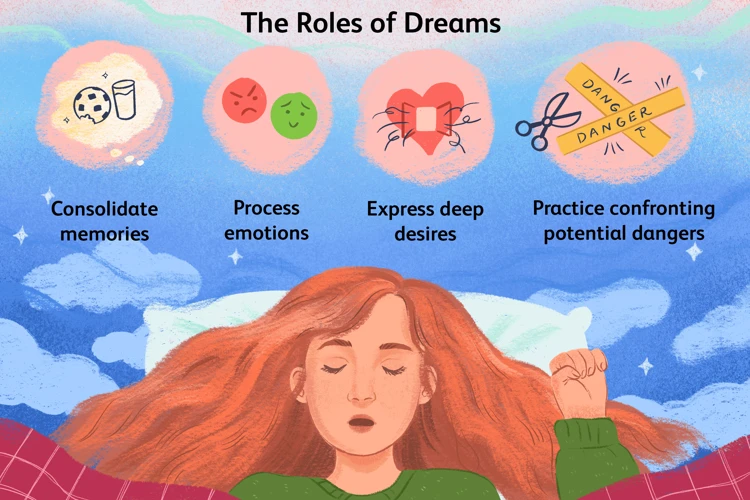Have you ever woken up from a dream where you were falling and wondered what it meant? Falling dreams are one of the most common and intriguing types of dreams that people experience. They can evoke a range of emotions, from fear and anxiety to serenity and excitement. But what do these dreams symbolize? In this in-depth article, we will explore the deeper meaning behind falling dreams and decipher the symbolism behind different falling scenarios. We will also delve into the common emotions associated with these dreams and the factors that influence their interpretation. So, fasten your seatbelts as we take a deep dive into the intriguing world of falling dream symbolism.
The Importance of Dream Symbols

Dreams have long fascinated and intrigued us, offering a glimpse into the mysterious depths of our subconscious minds. Within these dreams, symbols play a crucial role in conveying messages and meanings that may be hidden from our conscious awareness. Dream symbols act as a bridge between our conscious and unconscious selves, providing insights into our emotions, desires, fears, and experiences. Analyzing and interpreting these symbols can give us valuable insights into our inner workings and help us uncover hidden truths about ourselves. Falling dreams are no exception. By understanding the symbolism of falling dreams, we can gain a better understanding of our own fears, insecurities, and the need to let go. These symbols can serve as guideposts on our journey of self-discovery, helping us find resolution and overcome obstacles that may be holding us back. Whether we experience a single falling dream or recurring falling dreams, their significance lies in the messages they carry and the opportunity they present for personal growth and transformation. By diving deeper into the symbolism of these dreams, we can unlock the wisdom they hold and embark on a path towards healing and self-improvement.
The Symbolism of Falling Dreams

Falling dreams hold rich symbolism that can provide insights into our deepest fears, desires, and personal growth. Fear and insecurity are one of the primary themes associated with falling dreams. The sensation of plummeting can reflect our anxieties about failure, vulnerability, or a loss of control in waking life. It serves as a metaphor for facing our fears and overcoming obstacles. Another significant aspect of falling dreams is the notion of letting go and surrendering. The act of falling can represent the need to release control and trust the process of life. It prompts us to examine areas where we may be holding onto rigid beliefs or attitudes that hinder our progress. Additionally, falling dreams symbolize a loss of control and the need to adapt to unexpected changes or circumstances. These dreams often arise during times of transition or when we are feeling overwhelmed by external pressures. They encourage us to find inner stability and balance amidst the chaos. By understanding and reflecting upon the symbolism of falling dreams, we can gain valuable insights into our emotional landscape, confront our fears head-on, and work towards overcoming them for personal growth and transformation.
1. Fear and Insecurity
Falling dreams often symbolize deep-seated fears and insecurities within us. When we dream of falling, it triggers a primal response linked to our fear of losing control and the unknown. The sensation of plummeting into the abyss can evoke feelings of vulnerability, powerlessness, and a lack of stability. These dreams reflect the anxieties we may have about our abilities, decisions, or the uncertain future. Fear of failure is a common underlying theme in falling dreams, as the act of falling can represent the fear of not measuring up to expectations or falling short of our goals. It may also represent a fear of letting others down or the fear of public embarrassment. These dreams serve as reminders to address and confront our fears and insecurities, to develop resilience, and to embrace the unknown. By acknowledging and understanding these fears, we can work towards overcoming them and reclaiming our sense of security and self-confidence.
2. Letting Go and Surrender
Letting go and surrendering are common themes in falling dreams. When we dream of falling, it can symbolize the need to relinquish control and trust in the natural flow of life. This dream may indicate that we are holding onto something or resisting a change that is necessary for our personal growth. The act of falling in the dream can serve as a metaphorical release, encouraging us to let go of our fears, attachments, and limitations.
In these dreams, our instinctive reaction may be to resist the fall, desperately trying to regain control. However, the symbolism of falling dreams urges us to surrender to the process and embrace the unknown. It teaches us that there is strength in relinquishing control and allowing life to unfold organically. By surrendering, we open ourselves up to new possibilities, opportunities, and experiences that we may have otherwise missed.
One way to interpret the theme of letting go and surrender in falling dreams is by reflecting on our waking life. Are there situations or relationships where we are clinging onto a sense of control or resisting change? Are we holding onto limiting beliefs or expectations? These dreams serve as gentle reminders to loosen our grip and trust in the journey.
In the journey of surrender, falling dreams can be seen as an invitation to release the need for control and embrace the flow of life. They encourage us to have faith in ourselves and in the universe, knowing that even though we may experience setbacks and challenges, we have the strength to rise again. By letting go, we create space for growth, transformation, and a deeper sense of inner peace.
3. Loss of Control
Loss of control is a key element in the symbolism of falling dreams. When we dream of falling, it often represents a feeling of powerlessness or a lack of control over a situation in our waking lives. It can be a reflection of our fear of not being able to influence the events around us or steer our lives in the desired direction. This loss of control can stem from various sources, such as work-related stress, relationship issues, or personal insecurities. Falling dreams can serve as a reminder to reevaluate our circumstances and regain a sense of autonomy and agency. It prompts us to examine areas in our life where we may have surrendered control or allowed external factors to dictate our actions. By recognizing this symbolism, we can take steps to regain control of our lives and make conscious choices that align with our values and aspirations. It is through confronting and addressing our feelings of powerlessness that we can reclaim our personal power and steer our lives in a direction that feels authentic and fulfilling. So, the next time you find yourself plummeting in a dream, remember that it may be a signal to reassess the areas in your waking life where you may be experiencing a loss of control and take proactive steps to regain your power.
Interpreting Specific Falling Scenarios

The symbolism of falling dreams can vary depending on the specific scenarios and circumstances depicted. Each falling scenario carries its own unique message and interpretation. Falling from a great height symbolizes a fear of failure, a loss of control, or a feeling of being overwhelmed by life’s challenges. It may suggest the need to let go of unrealistic expectations and find balance in our pursuits. Falling slowly signifies a gradual loss of control, a sense of being stuck or unable to make progress in life. This dream scenario may indicate the need for patience and a reassessment of our goals and priorities. On the other hand, falling forever represents a recurring theme in falling dreams, pointing towards unresolved issues, persistent anxieties, or feelings of being trapped. This scenario urges us to confront and address these underlying concerns in order to find freedom and liberation. Analyzing these specific falling scenarios can provide valuable insights into our subconscious fears, desires, and the areas of our lives that require attention and growth.
1. Falling from a Great Height
Falling from a Great Height: One common scenario in falling dreams is the sensation of plummeting from a great height. This type of dream often signifies a sense of fear and insecurity. The height symbolizes a challenge or goal that feels overwhelming or unattainable, causing anxiety and a fear of failure. It may reflect a situation in waking life where you are grappling with a sense of inadequacy or a lack of control. The dream could be a manifestation of your subconscious mind urging you to confront these fears and take steps towards facing your insecurities head-on. It serves as a reminder that sometimes, the only way to grow and overcome obstacles is to face them directly, despite the initial trepidation. Consider reflecting on the areas of your life where you may be experiencing doubt or feeling overwhelmed. Identifying the source of your fear can empower you to take necessary actions and regain a sense of control. Remember, falling from a great height in dreams can ultimately represent an opportunity for personal growth and conquering self-imposed limitations.
2. Falling Slowly
When it comes to falling dreams, the speed at which we descend can hold significant symbolism. Falling slowly in a dream often represents a sense of gradual loss or decline in some aspect of our lives. This dream scenario may indicate a situation where we feel a lack of control or a slow progression towards failure or an undesirable outcome. It may be a reflection of a relationship or a job that is deteriorating slowly over time. It can also represent a fear of getting old or a sense of losing vitality and energy. Falling slowly suggests that we are aware of the decline happening, but we may feel powerless to stop it. This dream can serve as a wake-up call to address issues and take proactive measures to reverse the downward trajectory. It calls for introspection and taking steps towards regaining control and creating positive change. By recognizing the symbolism of falling slowly, we can identify areas in our lives that require attention and take the necessary actions to alter our course.
3. Falling Forever
In some falling dreams, the sensation of falling seems to stretch on endlessly, creating a feeling of perpetual descent. This type of dream often represents a sense of being trapped or stuck in a difficult situation or a cycle of negative emotions. The never-ending fall signifies a loss of control and a feeling of powerlessness. It may reflect a fear of being unable to break free from a particular challenge or circumstance in waking life.
When experiencing a falling forever dream, it’s important to examine the emotions that accompany the dream. Is there a deep sense of hopelessness or despair? This may indicate that you are grappling with persistent feelings of being overwhelmed or consumed by a problem. It could also suggest a fear of failure or a lack of confidence in your ability to navigate through life’s challenges.
This dream can serve as a powerful wake-up call to address the underlying issues that are causing you to feel trapped or powerless. It encourages you to take a closer look at the patterns and behaviors that may be perpetuating this cycle of negativity. By acknowledging and confronting these fears, you can begin the process of breaking free and regaining control over your circumstances.
To overcome the symbolism of falling forever, it is important to identify the specific aspects of your life that are making you feel stuck. This self-reflection can be done through journaling, therapy, or discussing your feelings with a trusted friend or counselor. Seek support and guidance to help you shift your perspective and develop strategies to regain control and create positive change in your life.
Remember, the symbolism of falling forever in a dream is not meant to be a doom and gloom prophecy, but rather an invitation to explore your deepest fears and work towards breaking free from the negative cycles that may be holding you back. Embrace this opportunity for growth and transformation, and you’ll find yourself on a path towards a brighter future.
Common Emotions Associated with Falling Dreams

The experience of falling in a dream can evoke a range of common emotions that can vary from person to person. One of the most prevalent emotions associated with falling dreams is anxiety and fear. The sense of plummeting and the lack of control can lead to feelings of unease and an underlying sense of foreboding. However, falling dreams are not always negative. They can also elicit emotions of sereneness and release. Falling can be symbolic of letting go and surrendering to the flow of life, allowing for a sense of peace and tranquility. In certain cases, falling dreams may even generate a feeling of freedom and excitement. The exhilaration of freefalling can translate into a sense of liberation and adventure. The emotions experienced during falling dreams provide valuable insights into our subconscious thoughts and feelings, allowing us to explore and process our emotions on a deeper level.
1. Anxiety and Fear
Experiencing anxiety and fear is one of the most common emotions associated with falling dreams. As we find ourselves plummeting through the air, our instinctual response to this terrifying scenario triggers feelings of panic and unease. This intense emotional response often reflects our real-life worries and anxieties that may be plaguing us. The symbolism of anxiety and fear in falling dreams is multifaceted. It can represent a deep-seated fear of failure or a sense of being overwhelmed by the challenges we face in our waking life. It may also be a manifestation of our insecurities and uncertainties, symbolizing the fear of losing control or the fear of letting go. Falling dreams can serve as a wake-up call to explore the root causes of our anxieties and confront them head-on. By facing our fears in the dream realm, we can begin to address them in our waking life, finding ways to build resilience, reduce stress, and regain a sense of empowerment. It is essential to remember that falling dreams are not meant to paralyze us with fear, but rather to motivate us to take action and overcome the obstacles that hold us back from reaching our full potential.
2. sereneness and Release
In some falling dreams, there is an unexpected shift in emotions from fear and anxiety to a sense of serenity and release. These dreams can often be accompanied by a feeling of weightlessness or a gentle descent. When you experience this tranquility in a falling dream, it signifies a freeing of the spirit and a release from the burdens and pressures of everyday life. It may suggest that you have come to a point of acceptance and surrender, letting go of control and allowing life to unfold naturally. This feeling of serenity and release can be seen as a positive symbol, indicating a sense of inner peace and a willingness to trust in the process of life. It is a reminder to find moments of tranquility and stillness amidst the chaos and challenges. It is important to embrace these feelings in the dream and carry them into your waking life, allowing yourself to let go and find peace even in the midst of uncertainty. By recognizing the symbolism of sereneness and release in falling dreams, you can harness the power of surrender and experience a greater sense of calm and acceptance in your waking life.
3. Freedom and Excitement
When it comes to falling dreams, not all interpretations are synonymous with fear and anxiety. In some instances, these dreams can evoke a sense of freedom and excitement. Imagine soaring through the sky, defying gravity, and embracing the exhilaration of the unknown. Falling dreams can be a symbol of breaking free from limitations, societal expectations, or self-imposed restrictions. They may indicate a desire for adventure, spontaneity, and embracing new experiences without fear. These dreams can serve as a reminder of the thrill that comes with stepping out of our comfort zones and taking risks. It is essential to reflect on the emotions felt during the dream to truly grasp the significance of the symbolism. If the feeling associated with the falling dream is one of liberation and elation, it may be an indication that you are ready to let go of constraints and embrace the opportunities that lie ahead. By acknowledging and harnessing the energy of freedom and excitement presented in these dreams, you can find the motivation and courage to pursue your passions, explore uncharted territories, and live life to the fullest. Embrace the sense of adventure and seize the opportunities that come your way, just as you did in the dream.
Factors Influencing Falling Dream Symbolism

The symbolism of falling dreams can be influenced by a multitude of factors, each unique to the individual dreamer. Personal experiences play a significant role in shaping the symbolism, as past events and traumas can manifest as recurring falling dreams. Cultural and social influences also come into play, as societal norms and beliefs can contribute to the interpretation of falling dreams. Additionally, an individual’s mental and emotional state can impact the symbolism, as feelings of anxiety, stress, or a desire for control may manifest as falling dreams. These dreams can also reflect a subconscious need for change or a release from the constraints of everyday life. Understanding these factors helps unlock the deeper meaning and messages embedded within falling dreams, allowing individuals to gain insight into their inner selves and take steps towards personal growth and self-fulfillment.
1. Personal Experiences
Our personal experiences play a significant role in shaping the symbolism of falling dreams. Each person brings their unique history, memories, and emotions to their dream world. When it comes to falling dreams, personal experiences of fear, insecurity, or loss can influence the interpretation of the dream symbol. For example, someone who has experienced a traumatic event involving falling or a loss of control may have falling dreams that reflect those past experiences. These dreams could serve as a way for the subconscious mind to process and make sense of those emotions. On the other hand, someone who has pursued a new opportunity or taken a leap of faith in their waking life may have falling dreams that symbolize the exhilaration and excitement of personal growth. Our personal experiences act as a filter through which the symbolism of falling dreams is intricately woven, making each interpretation unique to the individual. By examining our own experiences and the emotions associated with them, we can gain valuable insights into the hidden meanings of our falling dreams.
2. Cultural and Social Influences
Cultural and social influences play a significant role in shaping our perceptions and experiences, including how we interpret and understand falling dreams. Beliefs, customs, and societal norms can all impact the symbolism attached to these dreams. In some cultures, falling dreams may be seen as a sign of impending misfortune or a warning to be cautious. In others, they may be interpreted as a symbol of personal growth and letting go of the past. These cultural interpretations can influence our own beliefs and understanding of falling dreams.
Societal factors can also shape the symbolism of falling dreams. For example, in societies that prioritize success and achievement, falling dreams may be associated with a fear of failure or a loss of control. The pressure to meet societal expectations can manifest in our dreams, symbolizing the anxiety and stress we feel in our waking lives. On the other hand, in societies that value individualism and freedom, falling dreams may represent a desire to break free from restrictions or explore new possibilities.
It is essential to remember that cultural and social influences are not uniform and may vary from person to person. Personal experiences and individual beliefs also play a crucial role in shaping the symbolism of falling dreams. By considering the cultural and social factors at play, we can gain a more comprehensive understanding of the various interpretations and meanings associated with these dreams. Ultimately, the interpretation of falling dreams should be approached with an open mind, taking into account both personal and societal influences to uncover their true significance.
3. Mental and Emotional State
Understanding the influence of our mental and emotional state is crucial when interpreting falling dream symbolism. Our current state of mind and emotions can heavily impact the meaning behind these dreams. For instance, if we are experiencing high levels of stress, anxiety, or depression, our falling dreams may reflect feelings of being overwhelmed or out of control. On the other hand, if we are in a state of happiness and contentment, falling dreams may represent a sense of liberation and freedom from past burdens.
Additionally, our mental and emotional state can also affect the intensity and frequency of falling dreams. Those who are going through a particularly challenging period in their lives may experience more frequent falling dreams as their subconscious mind tries to process and cope with the emotions and difficulties they are facing.
To gain a deeper understanding of the influence of our mental and emotional state, it can be helpful to keep a dream journal. By recording our dreams and the emotions we felt during them, we can identify patterns and connections between our inner world and our waking life. This self-reflection can provide valuable insights into our mental and emotional state, allowing us to make positive changes and address any underlying issues that may be surfacing through our falling dreams.
Methods to Interpret Falling Dreams
When it comes to interpreting falling dreams, there are several methods you can employ to gain a deeper understanding of their meaning. One effective method is journaling and reflecting. Keep a dream journal by your bedside and immediately upon waking, jot down all the details of your falling dream. Reflect on the emotions, symbols, and events within the dream to uncover any underlying messages. Another approach is seeking professional guidance. Consulting a dream analyst or therapist who specializes in dream interpretation can provide valuable insights and interpretations you may have overlooked. They can help you explore the symbolism of your falling dream and guide you towards a clearer understanding of its significance. Self-analysis and introspection are also essential methods to interpret falling dreams. Taking the time to reflect on your own emotions, experiences, and personal associations with falling can lead to personal revelations. By examining the context of your dream and connecting it to your subconscious and waking life, you can unlock the hidden meanings of your falling dreams and apply them to your personal growth and development.
1. Journaling and Reflecting
Journaling and reflecting are powerful methods for interpreting falling dreams and gaining deeper insights into their symbolism. Keeping a dream journal can help you capture the details of your dreams as soon as you wake up, ensuring that you don’t forget any important aspects. When it comes to falling dreams, write down any specific scenarios, emotions, or symbols that stood out to you. Reflect on the symbolism of falling, considering what it might represent in your waking life. Is there a situation or aspect of your life where you feel like things are out of control? Journaling can help you connect the dots between your dream and your real-life experiences. Revisit your dream journal regularly to identify any patterns or recurring themes that may emerge in your falling dreams. By paying attention to the symbols and emotions associated with your dreams, you can gain a deeper understanding of their underlying meaning and how they relate to your personal journey. Reflecting on your falling dreams can also provide you with an opportunity for self-exploration and introspection, allowing you to uncover hidden fears or insecurities that may be holding you back. So, grab a pen and paper, and begin the journey of unraveling the symbolism of your falling dreams through the power of journaling and reflection.
2. Seeking Professional Guidance
Seeking professional guidance can be a valuable approach when it comes to interpreting falling dreams and understanding their deeper meaning. Sometimes, the symbolism and nuances within our dreams can be complex and challenging to decipher on our own. Consulting with a trained dream analyst or therapist who specializes in dream interpretation can provide valuable insights and guidance. These professionals have the expertise to help unravel the layers of symbolism present in falling dreams and offer interpretations that can shed light on their personal significance. They can assist in exploring the various emotions, fears, and experiences associated with falling dreams, providing a deeper understanding of their impact on our lives. Through their expertise, they can help individuals navigate through the intricate web of dream symbolism and provide personalized interpretations that resonate with their unique circumstances. Professional guidance not only allows for a more comprehensive understanding of falling dreams but also offers a supportive environment for processing and reflecting upon the emotions and themes that arise from these dreams. By seeking assistance from a dream analyst or therapist, individuals can gain valuable insights, develop a clearer perspective, and potentially facilitate personal growth and transformation.
3. Self-Analysis and Introspection
Self-analysis and introspection are powerful tools for interpreting falling dreams and understanding their deeper meaning. When you have a falling dream, take the time to reflect on your emotions, thoughts, and experiences from both your dream and waking life. Start by writing down the details of your dream in a journal, focusing on the emotions and sensations you experienced during the fall. Ask yourself questions like: What triggered the fall? How did you feel during the descent? Were you able to regain control or did you continue falling?
Next, analyze these dream elements in the context of your waking life. Look for any parallel situations or emotions that may correlate with your falling dream. Consider if you are facing a fear of failure, a loss of control, or a struggle to let go of something or someone. Pay attention to any patterns or recurring themes in your falling dreams to identify underlying issues or unresolved conflicts.
Introspection is a key component of self-analysis. Take the time to delve deep into your thoughts, emotions, and beliefs. Ask yourself why you may be experiencing recurring falling dreams or why this specific falling scenario appeared in your dream. Be open and honest with yourself, embracing any insights or revelations that may arise. It can be helpful to seek guidance from a therapist or dream analyst who can provide valuable insights and assist you in interpreting the symbolism of your falling dreams, especially if they persist or cause a significant emotional impact.
Remember, self-analysis and introspection are ongoing processes. Don’t be discouraged if you don’t immediately uncover all the answers. The goal is to cultivate self-awareness, gain a deeper understanding of your subconscious mind, and use that knowledge to navigate your waking life with clarity and purpose.
Conclusion
In conclusion, falling dreams hold a profound symbolism that goes beyond a simple sensation of plummeting. These dreams offer a window into our deepest fears, insecurities, and desires for freedom and release. The interpretation of falling dreams is highly personal, as it is influenced by our unique experiences, cultural background, and emotional state. Whether we experience anxiety and fear, sereneness and release, or freedom and excitement in these dreams, they serve as a catalyst for self-reflection and introspection. The symbolism of falling dreams invites us to explore our fears, confront our insecurities, and embrace the process of letting go. By journaling, seeking professional guidance, or engaging in self-analysis, we can further unravel the hidden messages within these dreams. So, the next time you find yourself in a free-falling adventure while asleep, pay attention to the emotions, scenarios, and symbols present in your dream. They just might hold the keys to unlocking your innermost thoughts and emotions, leading you towards personal growth, understanding, and a sense of empowerment.
Frequently Asked Questions
1. Why do falling dreams feel so real?
Falling dreams feel incredibly real because our brains can fully immerse us in the experience through vivid sensory details and heightened emotions. This is due to the activation of the amygdala, the part of the brain responsible for processing emotions, during REM sleep, where most dreaming occurs.
2. Are falling dreams always negative?
No, falling dreams are not always negative. While they may initially evoke fear or anxiety, the meaning behind the dream can vary. Falling can represent a release of control, a necessary step towards growth, or a reminder to confront our fears head-on.
3. Can falling dreams predict a physical fall or accident?
No, falling dreams do not have the ability to predict physical falls or accidents. They are symbolic representations of our emotions, experiences, and subconscious thoughts. However, if you have concerns about your safety, it’s always wise to take necessary precautions and address any underlying issues causing anxiety.
4. Do falling dreams always have a deeper meaning?
While falling dreams often have deeper meanings, not every dream will have a profound significance. Dreams can also be the product of random brain activity and processing of daily experiences. It’s essential to consider the context and personal emotions associated with the dream to determine its meaning.
5. Can falling dreams help us overcome fear and insecurity?
Yes, falling dreams can serve as a catalyst for overcoming fear and insecurity. By exploring the symbolism and reflecting on the emotions triggered by the dream, we can gain insights into the root causes of our fears. This self-awareness can empower us to take steps towards overcoming those fears and embracing personal growth.
6. Why do falling dreams often occur during stressful periods?
Falling dreams commonly occur during stressful periods because they reflect our underlying anxieties and potential feelings of losing control. Stress can heighten our emotional state, making us more susceptible to dreams that mirror our internal struggles.
7. Are falling dreams more common in certain age groups?
Falling dreams can occur in any age group, but they may be more prevalent in children and young adults. This could be due to the developmental stage of encountering new challenges and uncertainties, as well as the heightened emotional experiences during these phases of life.
8. Can falling dreams be recurring?
Yes, falling dreams can be recurring. They may persist if the underlying issues or emotions causing the dream are not addressed. Recurring falling dreams can indicate a need for personal reflection and resolution of unresolved feelings or situations.
9. Can other dream symbols be related to falling dreams?
Absolutely! Dreams are complex, and various symbols can intertwine and provide deeper layers of meaning. Other symbols, such as flying, being chased, or water, may appear alongside falling dreams, adding additional context and insights to the overall dream interpretation.
10. When should I seek professional help for recurring falling dreams?
If recurring falling dreams are causing significant distress, interfering with daily life, or if you feel overwhelmed and unable to find resolution on your own, it can be beneficial to seek professional help. A therapist or dream analyst can provide guidance and support in exploring the underlying emotions and meanings behind these dreams.








